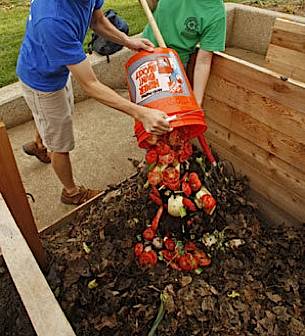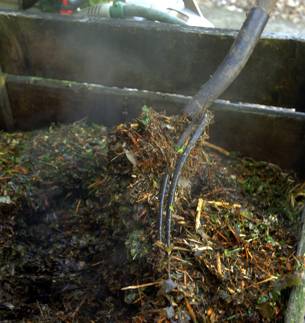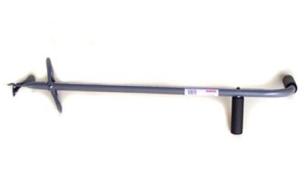Making Compost: Getting Started with the Right Tools

Making Compost - Use The Correct Tools
Getting started with making compost isn't hard; remember, composting is a completely natural process and is going to happen whether you help it or not.
Managing a pile of rotting organic matter requires only a few simple tools, some of which you may already own.
There are a few tools of the trade that will make your composting adventure safe and successful.
Making Compost - Safety First!
As with any type of gardening activity, you're going to be out in the sun, getting your hands dirty, and working with some sharp-edged tools.
Taking some simple precautions will keep composting fun, and not hazardous to your health.
Here are a few items you'll want to have on hand when you're working with your compost:
- Gloves: A pair of quality, good-fitting garden gloves are a must to protect your hands from scratches, scrapes, blisters, and dirt.
- Eye protection: Wearing a pair of goggles or safety glasses will protect your eyes from any sort of debris or dust particles that might become airborne while you're churning and turning your compost.
- Dust Mask: Your compost pile may contain things like dust particles, pollen, or mold spores that you're not going to want to inhale. A dust mask will protect you if you're prone to allergies, asthma, or other respiratory issues.
- Sunscreen: You're going to be outdoors while you're working with your compost, and that's a good thing! But the sun's UV rays are damaging to your skin, and turning compost (or doing anything else!) is much less fun with a sunburn. Wear a sunscreen of at least SPF 15, wear a wide-brimmed hat and long-sleeved shirt and pants, and stay out of the sun between 10 am to 3 pm when the sun's rays are most damaging.

Making Compost - Use The Correct Tools
Making Compost - The Right Tools to Make Composting Easier
To get started composting, all you really need is a long-handled fork, a spade or shovel, and something to chop up larger stems or prunings. There are other tools available, however, that will make things much easier.
- Pitchfork or Compost Fork: A pitchfork or compost fork with 4 or 5 long, thin tines is designed to easily sink into a pile of compost, allowing you to easily lift and turn over compost.
- Soil Fork: This tool has prongs that are shorter, thicker and sturdier than a pitchfork or compost fork. This makes a soil fork useful for turning almost-finished compost or digging finished compost from the compost pile and moving it to your garden or lawn.
- Shovel: You probably already own a shovel which you can use to move finished compost. If you have to buy any one kind of shovel, a pointed-blade shovel will be most useful for chopping up organic matter into small pieces before it goes into the compost pile. A square-blade digging spade is also good at chopping up your compost materials.
- High-quality Hose: Moisture is essential for successful composting, so easy access to a water source is crucial. A good, high-quality hose will eliminate the kinking and cracking associated with cheaper hoses. With garden hoses, you get what you pay for! Having a hose nozzle that you can turn on and off to conserve water is also helpful. A fine spray from a good nozzle does a great job keeping compost moist without wasting water.
Making Compost - Moving Compost from Point A to Point B
Getting organic matter to your compost pile, and finished compost to your garden area requires something to move it in. A heavy duty plastic bucket is perfect for moving small amounts of material. Larger amounts can be moved around with something as simple as a sturdy tarp or carry bag. If you're going to be moving lots of compost around, or do lots of other yard or garden work, investing in a good wheelbarrow is a good idea.

Making Compost - Aerating Crank
Making Compost - Other Composting Gadgets
As the ruler of your own little kingdom of rotting organic matter, there are some additional items that will help you speed up the composting process.
- A compost thermometer mounted on a long probe is ideal for monitoring your compost's temperature.
- An aerating crank (also known as a compost crank) makes it easy to turn your compost. Aerating cranks work by plunging the long tool deep into the compost material to mix and oxygenate it.
- If you are going to have lots of matter to chop and dice, you may want to consider some other tool options like a machete or cutter mattock. These make chopping and cutting organic matter into smaller pieces much easier, though they are very sharp tools requiring caution and protective gear.
Making Compost - Tool-Buying Tips
Gardening tools are available in a dizzying range of prices and quality. Spending a little extra money for a high-quality tool will provide years of dedicated service. When selecting a new tool for your composting endeavor, consider the following:
- How does it feel?: a tool that is comfortable to use is going to get used more often. Make sure the tool you select has the right weight and balance for you, and that it is the appropriate length. Using a tool that is too heavy or cumbersome to use can lead to muscle strain or other injuries.
- How is it made?: A well-built tool will work better and last longer; select tools that have the blade and collar (which attaches the blade to the handle) are forged in one piece of metal. Forged tools are heavier and sturdier than stamped tools which are cut and bent from a sheet of metal. While cheaper, stamped metal tools are often weaker and less durable. High-carbon forged steel is strong and will keep a sharp blade over time. Stainless steel tools are another good choice, and are rust resistant. Aluminum blades, while lighter, usually are not strong enough for long term use. Tool handles are made of either hardwood or fiberglass. Hardwoods are less expensive and do a good job of absorbing shocks to reduce muscle fatigue, but require maintenance to prevent cracking. Fiberglass is stronger than hardwood, maintenance-free and lightweight, but more expensive and offers less shock absorption.
Making Compost - Take Care of Your Tools!
Proper maintenance of your tools will keep them in good shape for years (sometimes generations!) to come. Keep your blades clean by wiping or hosing off dirt and applying a rust-inhibiting lubricant a few times a year to prevent rust.
Maintain your wood-handled tools by wiping and drying the wood after each use, and keep them out of the sun, wind, and rain when not in use. Moisture will cause the wood to crack, split and splinter over time. Seal the wood from moisture by wiping the handle down with a rag dipped in linseed oil, available at any hardware store.
Interested In More On Composting?
We offer a lot of information on composting and some great composting product reviews. If you really want to get your feet wet in the composting business, be sure to read these additional articles of interest:
Composting 101
Worm Composting
Vermiculture - A Worms Healthy Home
Vermicomposting - Troubleshooting Tips
Compost Pit
Compost Container
Making Compost
Soil Saver Classic Composter Product Review
GeoBin Composting Container Product Review
Worm Factory 360 Product Review



































































